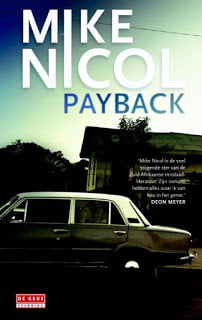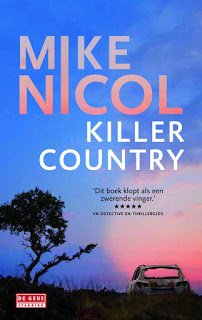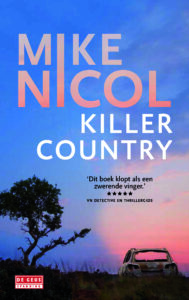is Mike Nicol?
convinced him that maybe he didn’t have the strength for surfing any longer.
Other than that he started life as a journalist and now works as an online
creative writing teacher and an editor for various publishers. He is also known
to have published novels and first did so in 1989, although since 2010 he has
taken, with much enthusiasm, to writing crime thrillers. He has also published
some works of non-fiction, including a short biography of Nelson Mandela, and
in the distant past published two volumes of poetry. He lives on the side of a
mountain with views of False Bay where the whales come to breed each spring.
There are snakes in his garden. Now and then, when they’re passing through they
sometimes try to enter through his front door.
You live in Cape
Town. Was this the fundamental idea to write this trilogy and to give it
this title?
Cape Town is the ideal setting for a crime novel. It is a city of great
beauty – wild beaches, a mountain in the middle of the city – and great riches.
It is also a city of poverty and shame. After all it was a city founded on
slavery and then the racial policies of the apartheid governments removed
coloured people – people of mixed blood – onto the windblown sandy Cape Flats
beyond the city limits. There poverty is endemic. Cape Town is also now the
murder capital of the country – thanks to the gangs that infest the Cape Flats
where streets often resemble war zones, and to a high incidence of domestic
killings. This contrast between the beautiful and the ugly, the rich and the
poor, this paradox, makes it an intriguing city as the setting for crime
fiction.
published in 2008. This book was published with us in 2015. I have no idea why
there was so much time between these parts (and the next 2 parts) in the
Netherlands/ Belgium while in Germany and England it is a bestseller. Do
you have any idea why that is?
a huge part. Maybe too if a book gets a reputation elsewhere it encourages
publishers in other countries to read it. I’m just thankful De Geus are
publishing the three.
it goes from drug trafficking, arms smuggling, hit men, project developers,
diamond robbery to corrupt agents and officials. Reality, fiction or a nice
mix?
witnessing a society creating itself and that process is both inspiring in some
forms and downright depressing in others. The awful part finds its way into the
fiction because for me fiction is about exposing the underbelly of society, the
rottenness in the system, the corruption in the politics and in business
dealings. And crime fiction is so good at doing this: it is satire, social
commentary, and, I hope, fast-paced storytelling all in the same package.
contrast between the loving husband and father on the one side and on the other
side a hard criminal. Has this been a conscious choice to process this aspect
in your book? To make it more ‘human’?
Buso – the two main characters – to be both hard men and family men. In a way
this mirrored our society as we moved from a period of armed struggle into a
period of trying to establish a social contract, a form of values by which we
could all live more compassionate lives. The pressures on Mace and Pylon – as
on the society – were and are daunting. In many instances we are bleeding – as
Mace bled.
the second part of the trilogy. How do you actually start to write such a
trilogy? Do you already have a general idea how things will develop or does
this come while writing?
to be a standalone. There was no follow-up planned but when I got to the end
and Sheemina February walked off the page I knew I had to follow, and this led
to Killer Country. But as you know the books work in and of themselves – they
are their own stories – but there is an arc narrative that involves Mace and
Sheemina that links the books and runs through them. Nevertheless by the time I
finished Killer Country I had no idea what would happen in their story in the
third book.
three ‘Black Heart’ will be released. Many readers will look forward to this.
Are you already working on a new book or any other project?
and I couldn’t imagine not having a book brewing in the background. In fact I
try and write every day. After Black Heart there are two other books Of Cops
& Robbers – which features two new characters – and Power Play – which
features Krista Bishop, Mace’s daughter from the trilogy. Later this year my
publishers in South Africa will bring out my latest book, Agents of the State
(back to the characters from Of Cops & Robbers one of whom is a surfer dude
and the other a hotshot gorgeous lawyer), and that will appear in the UK in
February. I have only just finished reading the proof pages so the book has not
been made available for sale elsewhere yet. Just so that you know where I am
headed: I now believe that the biggest crime in South Africa is being committed
by government so I am heading into the world of espionage.
doesn’t know your books: give us a good reason why they should read them?
a lot of humor. Do you have a sense of humor?
tell you that the main character in Of Cops & Robbers is in his thirties,
has wild blond hair and is extremely attractive with a well-toned body and was
modeled on me, would you call that a sense of humour? Or delusional?
Humour is important in books, I reckon. The reader needs a break from the
suspense and the violence, and when characters are being funny the reader has
an opportunity to breathe. After all crime fiction is just a hair’s breadth
away from pastiche and so you need a sense of humour to write it.
ritual?
sort of work that earns money.
are typical books for men and for women?
men but then more women read than men. At least in the English speaking section
of the world.
things ‘Mandela: the authorized portrait’. Furthermore you have written novels
and poetry. The difference between these books and crime fiction couldn’t be
bigger. What do you prefer to write or do you see everything as a challenge?
that frequently. I really really enjoy the crime writing. It is great fun and
it allows me to examine my society, as I’ve mentioned. Unfortunately the poetry
has disappeared – or rather it has become the prose, because I still believe it
is impossible to write prose unless you’ve written poetry. Poetry teaches the
value of the individual word and the rhythm of one word with the next – the
music – that is so essential to good prose.
you give online writing courses. How does it work because I can’t image
how it works?
the creative writing courses has a website and there are modules of instruction
released on this website each week for ten weeks. There is also an online forum
each week where we discuss topics – the format here is not dissimilar to
Facebook posts – and then every two weeks the students have an assignment to
complete. There are no marks awarded on the course and the intention is to
supply solid feedback and to expose students to the various techniques that go
into creating fiction. I also run a private masterclass with a colleague and on
that we supervise a bunch of students (25) for nine months. We use Google Drive
and Facebook to run this masterclass and those two apps work very effectively.
And of course the nice thing is that the commuting time is no longer than it
takes to walk to my desk.
with Germany; tell us please?
and Essen and I’ve been there frequently on author’s tours. In addition they
are dedicated and knowledgeable readers and they – like you in the Netherlands
and Belgium – read crime fiction without any put-downs. In the English speaking
world, crime fiction is seen as a genre and therefore not up to the standards
of literary authors.
think social media is such as Twitter, Facebook, Instagram,..?
But it is just part of a mix which includes blogs – becoming ever more
important – and then print media, radio and television although television is
more focussed on the celeb authors.
questions whereby we like to know the person behind the author a little bit
more. Feel free to answer these questions
your favourite food and what food do you absolutely
dislike?
would be a better word – gem squashes – they have a pithy yellow interior
and bring back childhood mealtime horrors about not being able to leave the
table until every disgusting forkful of the gem squash had been swallowed. The
thought of that stringy texture makes me gag. Even now, writing this.
anyone, alive or deceased, who would you like to meet?
thing that you have ever done?
silent?
question: If you could draw or paint any environment where you have been, which
one would you draw or paint?
members are reading ‘Killer Country’. It could be that some questions will
follow as a result of this. These will also be send by mail.
members) has already the following question for you: The covers of your books
are different from country to country. Which cover of all the books do you like
the most? (You may add a photo)
French version.
for your cooperation.
Eerder verschenen op Perfecte Buren.




